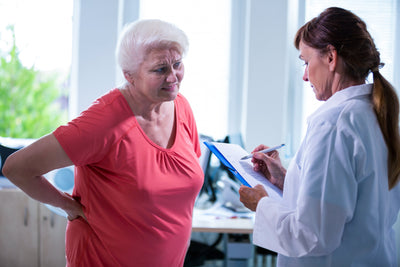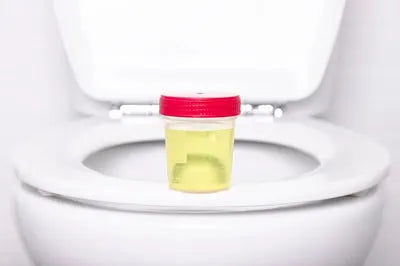“I birthed a little baby girl recently. Since my third trimester, I've been suffering from urge incontinence. Suddenly I'd feel a strong urge to visit the bathroom without any prior warning! It made my life so difficult. My extremely pregnant self, took 5 minutes to get off the sofa and another 2 minutes to get to the bathroom, after the deed was already done, fully soaked in my own piss. Friends Diapers entered my life back then and my life became easier. My incontinence is cured now and my baby is also 4 months old. Thanks to Friends birthing became a little easier.” – Fatima Shaikh in the comments of one of our Facebook posts.
Like Fatima said, sudden, strong and frequent urge to urinate is the calling card of urge incontinence.
So, what is urge incontinence? To answer that question, first we’ll have to look at what urinary incontinence is — Urinary Incontinence is the loss of bladder control that causes problems ranging from small leaks of urine to sudden accidents without any warning!
There are multiple types of urinary incontinence, each with different causes and symptoms that require a different treatment. And we are here today to look specifically at the causes, and signs and symptoms of urge incontinence in women.
Causes of Urge Incontinence in Women

The process of urination is mainly controlled by the brain, nerves and the bladder. When we talk about urge incontinence, sphincter plays a huge part too.
The bladder is a muscular sac that stores and holds the urine for you until you are ready to relieve yourself. Till then, the bladder and the sphincter work together to prevent the urine from leaking.
The bladder will relax to expand and accommodate more urine, while the sphincter, around the opening of the bladder, squeezes to prevent the urine from leaking into the urethra. (Urethra is the tube that carries the urine from the bladder, and out of the body). When you are ready to urinate, the bladder muscles squeeze in to force the urine out, and the sphincter relaxes to allow the urine to pass through.
Urge incontinence causes these bladder muscles to squeeze or contract at the wrong times without any rhyme or reason, and you will feel a sudden, strong urge to urinate.
We’ll take a moment to clarify something, many people think incontinence is a part of aging and hence, don’t seek help. While aging is one of the many causes, urge incontinence is not a part of aging. Which means, it can be caused by some other factors and can be treated, cured too!
Urge incontinence is not unique only to women, but it is twice as common among women when compared to men. But why is that? Because of the following reasons:
-
Pregnancy and Delivery

Pregnancy can cause urge incontinence for several reasons. During pregnancy, the weight of your growing baby can put pressure on the bladder which can make it harder for you to hold the urine in. Another reason is that the increased blood flow to the pelvic area during pregnancy can cause the bladder to become more sensitive and make it harder for you to hold the urine in.
The pelvic floor is a group of muscles and connective tissue that act as a muscular sling or hammock at the base of the pelvis. The pelvic floor muscles support the pelvic organs, including the bladder, uterus and rectum.
During childbirth, the baby passing through the birth canal can put pressure on the pelvic floor muscles and nerves causing it to be stretched or damaged, leading to weakness. These muscles also play a crucial role in supporting the bladder and the urination process, if they are weakened, it can result in urge incontinence.
-
Aging
As you age, parts of your body weaken. The bladder can weaken and become unable to hold the urine in for longer. And the nerves that control the bladder can also become less sensitive, making it harder for the brain to receive the signal that the bladder is full. These conditions can develop into urge incontinence.
-
Obesity
Obesity can put excess pressure on the bladder and the pelvic floor muscles, and can result in loss of bladder control and urge incontinence.
-
Pelvic Organ Prolapse
Pelvic organ prolapse is a condition in which the pelvic floor is weakened or damaged causing the organs in the pelvis to drop down from their normal position and bulge into the vaginal canal or outside the vaginal opening. This can lead to irritation of the bladder and a frequent urge to urinate.
-
Alcohol and Caffeine Consumption
Caffeine is a stimulant that can irritate the bladder and increase the frequency of urination, and alcohol can interfere with the functioning of the muscles that control the bladder. No more coffee, tea or chocolates if you have incontinence!
-
Brain or Spinal Cord Injury
When your brain or spinal cord is injured, the nerves that control the bladder might not be able to communicate with the brain actively, resulting in you not knowing when your bladder is full and needs to be emptied.
Symptoms of Urge Urinary Incontinence in Women
Urge urinary incontinence symptoms are really specific and can be easily identified:
-
Sudden and uncontrollable urge to pee.
-
Frequent trips to the toilet.
-
Leaking urine during regular day-to-day activities.
-
Wetting the bed (enuresis) at night.
-
Being unable to reach the toilet in time.
When to see a doctor
As soon as you notice the symptoms. Over time, symptoms from urge incontinence can get worse and become more noticeable. It can also restrict your daily activities and negatively impact the quality of your life. Talk with your doctor and try to come up with a treatment you both agree on. There are also many natural treatments you can try before visiting a doctor.
While you’re seeking treatment you can rely on Friends Adult diapers to keep your dry and safe from embarrassing moments in public. 😊 Friends Adult Diapers:
-
Are slim and discreet to fit under your regular clothes.
-
Super- absorbent and soft.
-
Equipped with side leak guards to prevent trickles down the thighs.
-
Anti-bacterial and enhanced with aloe vera extracts to keep you from infections and irritation.
Azadi Mubarak with Friends!
Frequently Asked Questions about Urge Incontinence in Women
1. Does urge incontinence go away on its own?
Unfortunately, urge incontinence – or any urinary incontinence problem – might not go away on its own. If you have urge incontinence, please visit a doctor and try to come up with a solution with their help. We understand it can be hard to talk about incontinence problems but letting them be isn’t an option either.
2. Can urge incontinence be caused by stress and anxiety?
No, but when you are stressed or anxious, your body's fight or flight response is activated, which can lead to increased muscle tension and changes in bladder function. This can cause you to feel the urge to urinate more frequently or suddenly. However, this should happen only when you are under stress and shouldn’t become a chronic condition. If your urge incontinence is chronic, then it most probably isn’t because of stress and must be because of some other cause/causes.
3. Does depression cause urinary incontinence in women?
Yes, depression can also cause urge incontinence. Depression is a common cause of decreased libido, which can lead to decreased sexual activity and a decrease in the production of estrogen in women. Estrogen helps to maintain the health of the urinary tract and the muscles of the pelvic floor, which play a role in bladder control and a decrease in estrogen levels can lead to incontinence problems.
















